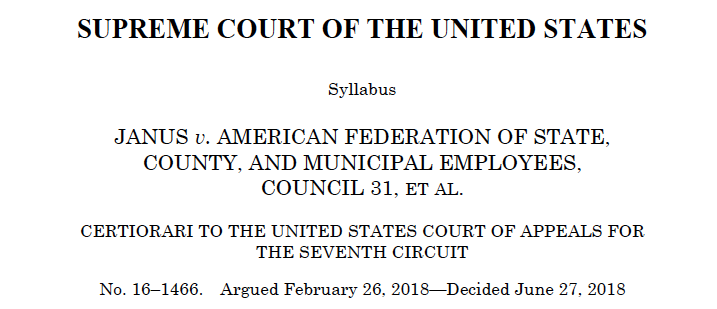- Free Consultation: (631) 352-0050 Tap Here to Call Us
Looking at the Janus Decision’s Dissent

Last week, Famighetti & Weinick PLLC posted a blog summarizing the Janus v. AFSCME union case which overturned the 1977 decision, Abood v. Detroit Board of Education. The majority decision held that employees who choose not to be part of a union but who nonetheless benefit from collective bargaining results are no longer required to pay union agency fees. Today’s Long Island employment law blog discusses the dissenting opinion in Janus.
As we discussed in our original Janus case blog, from a strictly legal perspective, the Janus majority opinion is a First Amendment free speech case. From the point of view of the four dissenting Justices in Janus, however, the nation’s First Amendment jurisprudence makes clear that agency fees do not implicate any First Amendment concerns.
To recap the essential facts of Janus, the case looked at the constitutionality of agency fees charged by public-sector unions. Agency fees are collected by unions from employees who choose not to join a public-sector union. The fees are supposed to support administrative functions of the union. The Supreme Court first looked at these arrangements in the Abood case and set forth the rules under which states could constitutionally apply these fees. Since Abood, 22 states have relied on those rules to implement laws concerning public-sector unions.
Justice Kagan wrote the dissenting opinion in Janus, which was joined by Justices Ginsburg, Breyer, and Sotomayor. The dissent’s argument focused on two main concerns. First, Justice Kagan discussed the First Amendment and why the First Amendment does not prohibit the collection of agency fees. Second, Justice Kagan discussed the principle of stare decisis and why the majority improperly overturned Abood. Each argument is summarized below. The dissent begins by discussing the history of First Amendment principles. Justice Kagan found persuasive the fact that the Court has time and again held that employees do not shed their First Amendment rights simply by going to work for the government, but that when the government acts as an employer, it must be given wide latitude to regulate the workplace. The primary reason for this general rule is that governments must be able effectively and efficiently operate its workplace without having every employment rule turned unto a constitutional question.
Generally, employees complaining about workplace conditions or terms and conditions of employment, do not enjoy First Amendment protections. Instead, for the First Amendment to apply, employees must be speaking as citizen on a matter of public concern. Accordingly, Justice Kagan rejected the majority’s arguments about why the First Amendment applies and she argued that the agency fees fit squarely within the government’s lawful and constitutional regulation of its workplaces.
Next, Justice Kagan discussed the principle of stare decisis, a legal doctrine recognizing the importance of following precedent (prior U.S. Supreme Court decisions). The dissent notes that a strong factor weighing against overturning Abood is the heavy reliance that has been placed on the decision. The Court should not overrule itself when governments and people have come to rely on a rule of law. Indeed, this is a basic principle of stare decisis – relying on the stability of a rule of law. Justice Kagan noted that over twenty states that had already authorized union fees from non-union employees would now be forced to figure out a new way to structure its employee relations. The Janus decision also effectively destroys many collective bargaining agreements thereby forcing some employees to renegotiate contracts. In New York City alone, Justice Kagan wrote that 144 contracts with 97 public-sector unions will have to be renegotiated.
The dissent also notes that there was no indication from the lower courts that there was confusion or misunderstanding in how to apply the rules of Abood further suggesting that overturning it was not appropriate.
In sum, the dissenting Justices view the Janus case as one that “will have large-scale consequences.” As noted by the dissent, eliminating non-union member fee requirements will hurt unions financially, leaving unions unarmed to adequately serve as an employee’s representative.
If you have questions about the First Amendment, the Janus decision, or public or private sector unions, contact a Famighetti & Weinick PLLC Long Island labor lawyer at 631-352-0050.
Today’s Long Island employment law blog was written law clerk Thalia Olaya.
Union dues case decided









